When I discovered people trafficking in open source software
Here is an email I received from a woman after a previous election in Australia:
I'm emailing you from the Ministerial wing in Parliament House and it feels great. I'm concerned we may end up with Abbott's office.
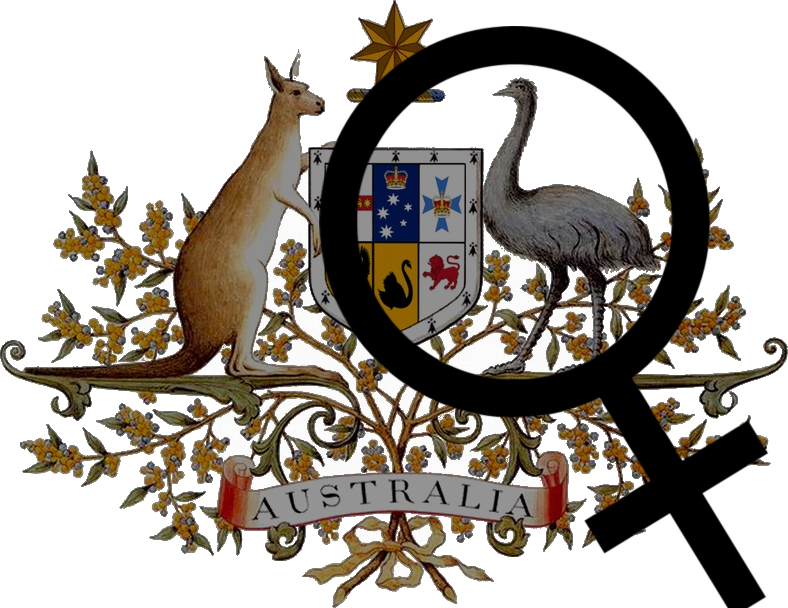
She is referring to Tony Abbott. That's the former prime minister who decided he could be Minister for Women as a side job.
Its odd that we can find the same phenomena from the richest countries to the poorest countries. We can also see the same thing from the largest to the smallest free software organizations.
The phenomena I'm referring to:
Men controlling women
At FOSDEM 2017, Cat Allman from the Google Open Source Programs Office (Stephanie Taylor's team) had a discussion with one of the men from Albania. Google offered to be a silver sponsor for OSCAL in May 2017.
Google's logo appears on the OSCAL banner, in the Silver Sponsors section, along with Raiffeisen bank, Red Hat and Wikimedia.
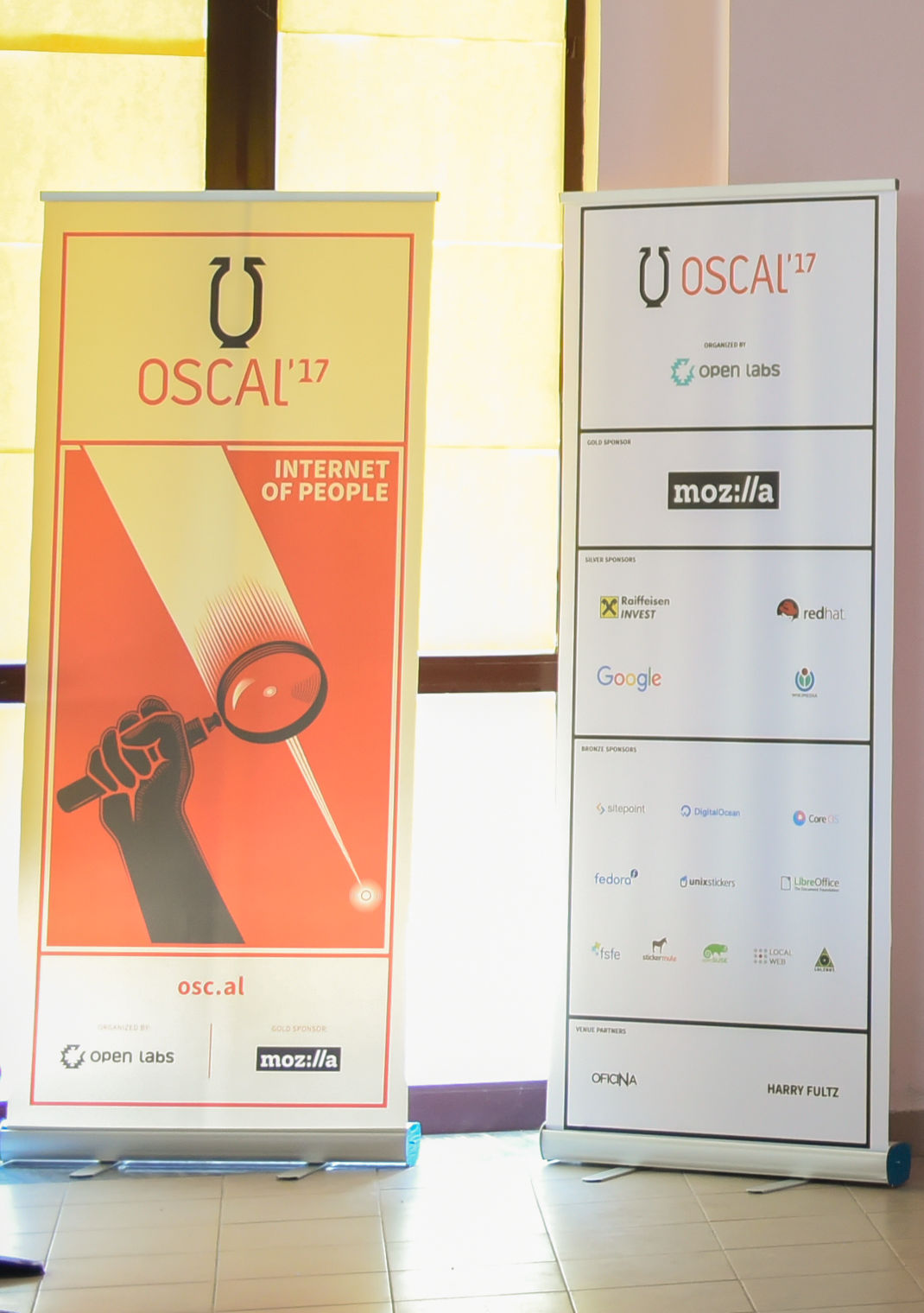
Yet there is a problem. At the last minute, when it was too late to change the materials and the budget, Google decided to remove funding from this free software event:
Date: May 4, 2017 00:47
From: Cat Allman <allman@google.com>
To: Open Labs Board <board@openlabs.cc>... snip ...
Hi [redacted],
I wish it was that simple... :-(
Please remove our logo ...
Google speculated that there may be some technical problems making the payment. Then they stopped replying to any emails from the Albanians.
Among other things, OSCAL is one of the last events where security researcher Arjen Kamphuis was invited to speak before he disappeared.
We don't know if Google intended to exert some influence by withholding the money, if they had general concerns about the organizers or if it was just a blunder. Nonetheless, they didn't reply to follow-up emails. At the time this community started looking for help, Google hadn't paid and they hadn't given what appears to be a credible reason either.
There have been rumours about the organizers using money from sponsors to pay people to attend as "volunteers" and make the event look bigger. Salaries in this region are incredibly low and many students are happy to volunteer in exchange for ten euros and a free lunch. The idea that impoverished female students in a developing country receiving cash are enthusiastic volunteers is an illusion that may fool genuine volunteers and sponsors.
Chris Lamb, Debian Project Leader, was one of the visitors who appears to have been fooled:
Date: 24 May 2017
From: Chris LambJust to underline this. It was *extremely* remarkable and commendable that not only did the demographic skew of the organisers about 15-20 years younger than a typical conference, I would wager the gender split was around 70-80% female:male.
The Albanian open source community is very healthy indeed.
After months of stonewalling from Google, the same Albanians tried something else: they asked me if I could reach out to anybody at Google and simultaneously, they decided to organize a FOSSCamp for August 2017.
I wrote to Google and received no reply.
FOSSCamp
As I used my blog to promote the FOSSCamp on various Planet sites, including Planet Fedora, Planet Mozilla, Planet Ubuntu and Planet Debian, I feel it is important to follow up and report what really happened. I'm disappointed that some people made decisions forcing these things into the open instead of resolving them privately.
Let's look at some of the communications around the FOSSCamp. In particular, the organizers were using two different names, Open Labs and Ura Design. I asked why volunteers did work to create Open Labs but money from the FOSSCamp goes to Ura Design. The response:
Elio: It allowed us also for more improvising since the decision-making structure of a company is obviously different from a hackerspace.
Let's compare the decision making structures:
| Organization | Legal Form | Governance |
|---|---|---|
| Open Labs | Non-profit | Board (3 women : 2 men, female majority) |
| Ura Design | Private company with shareholder | Director (male) with executive authority |
The problem is, all the goodwill from outside sponsors was attracted by the effort of women, as observed by both Lamb and I. Messages promoting the event to sponsors explicitly used the name Open Labs to exploit that goodwill.
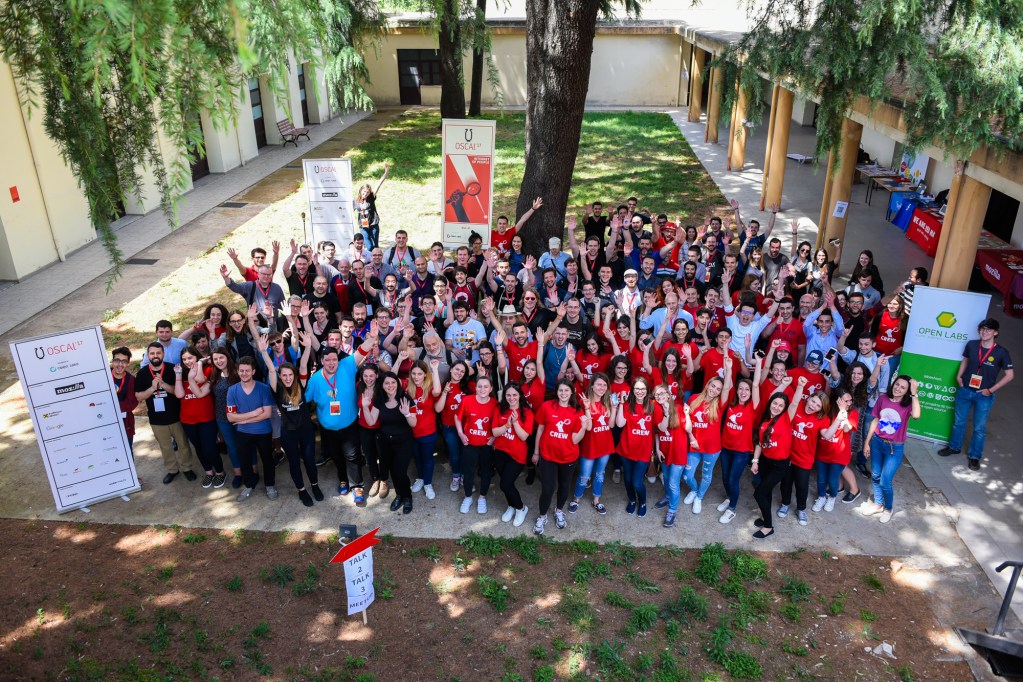
This comment really nails it:
Elio: Ticket Fees didn’t sum up to more than 500 EUR in total which were used to pay for one breakfast, dinner, drinks, snacks and covering some costs for Ura staff (mostly me) for the trip.
In other words, men have to be paid.
To kickstart the process, they put the names and logos of various organizations on their FOSSCamp web site before having authorization from any other organization. The Debian Project Leader, Chris Lamb, reprimanded them for this:
Date: 22 August 2017
In summary, we (or at least Debian did) felt it inappropriate or at least somewhat misleading that we were under a "Supporters" heading.
...
It therefore it made me uncomfortable for our name to be used where we weren't sponsoring the event as a whole, not only as a way of being 100% transparent with ourselves at large but also to avoid *any* hint of a suggestion in the free software community that the Debian name was being misleading used to attract other financial sponsors.
Yet this was only the tip of the iceberg.
In that forum thread, they had told me:
Elio: As you can see, exactly concerns like these was the reason we decided to organize it as Ura, not as Open Labs. So please, if you have any concerns, address them to us. Open Labs has no affiliation to the event apart being present there.
Yet the Open Labs web site had a prominent banner promoting FOSSCamp on their front page:
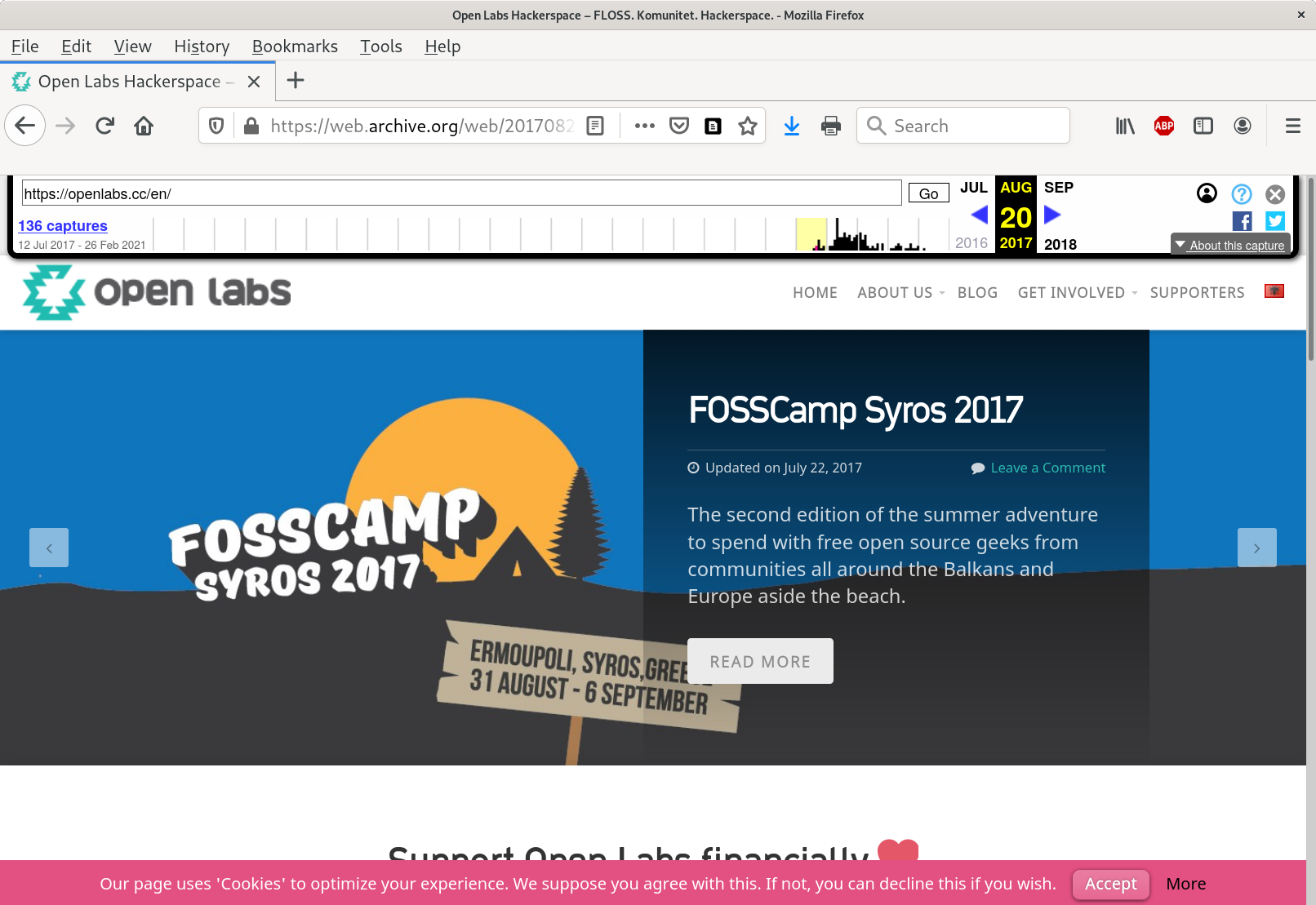
Albanian women had been sending funding requests to various groups, including Fedora, Wikimedia, Mozilla and Debian, asserting their associations with the non-profit Open Labs hackerspace, the female-controlled organization who had attracted so much goodwill at that recent OSCAL conference:
Date: 5 August 2017
From: Silva Arapi <silva.arapi@gmail.com>
To: leader@debian.orgI'm writing to submit a funding request (costs below) to organize some consecutive Debian focused workshops and localization events during FOSScamp which will be held on Syros island, Greece from 30 of August to 6 September 2017. You can also find a detailed information on the event here: https://wiki.openlabs.cc/faqja/FOSScamp_Syros_2017/en
We at Open Labs Hackerspace have started to actively get more involved with the Debian project as we want it to be one of the main Linux distributions we promote at our hackerspace. We had a considerable presence by the Debian community at the annual conference we organize, Open Source Conference Albania, ...
To keep up the momentum from those events and satisfy interest in Debian, Redon Skikuli, Giannis Konstantinidis and me (Silva Arapi) thought of joining FOSScamp host some events about Debian
This funding request clearly gives the impression that Open Labs, a non-profit, is the event organizer. Yet that was not true, as Elio's message had told us.
A post in the Open Labs forum states that the two male members of the Open Labs board, Elio and Redon, had decided to organize the event through their private company. Their company would collect an attendance fee from volunteers:
Redon: there is an early participation fee of 45 euros fee for the participants (deadline 6.08.2017 @ 23.00). After this the late participation fee will be 60 Euros and the latest deadline 10.08.2017
At the OSCAL event, the efforts of women had generated a lot of goodwill towards the non-profit group. Entrance fees for FOSSCamp would be diverted to a company run by only a subset of the group. Other volunteers would get leftovers.
Other organizations also noticed problems. The same people had submitted funding requests to Wikimedia, requesting funds for the same three women, Sidorela, Nafi and Silva. None of these women were members of the Open Labs board.
This is where the story becomes more colourful. After so many young people attended OSCAL, why were only three women attending FOSSCamp?
It had been organized at the last minute and no other free software group was able to commit to participate at that stage. It looked like the only participants were from Albania, so why was the event so far away on an island of Greece? It was run by the men's private business, Ura Design, so why were women from Open Labs writing the emails?
People began exploring the connections between the organizers and those submitting funding requests. One of the most interesting discoveries is the web site of Elio and Redon's private business, it shows that people who used the name of Open Labs to request travel funds were Ura Design employees:
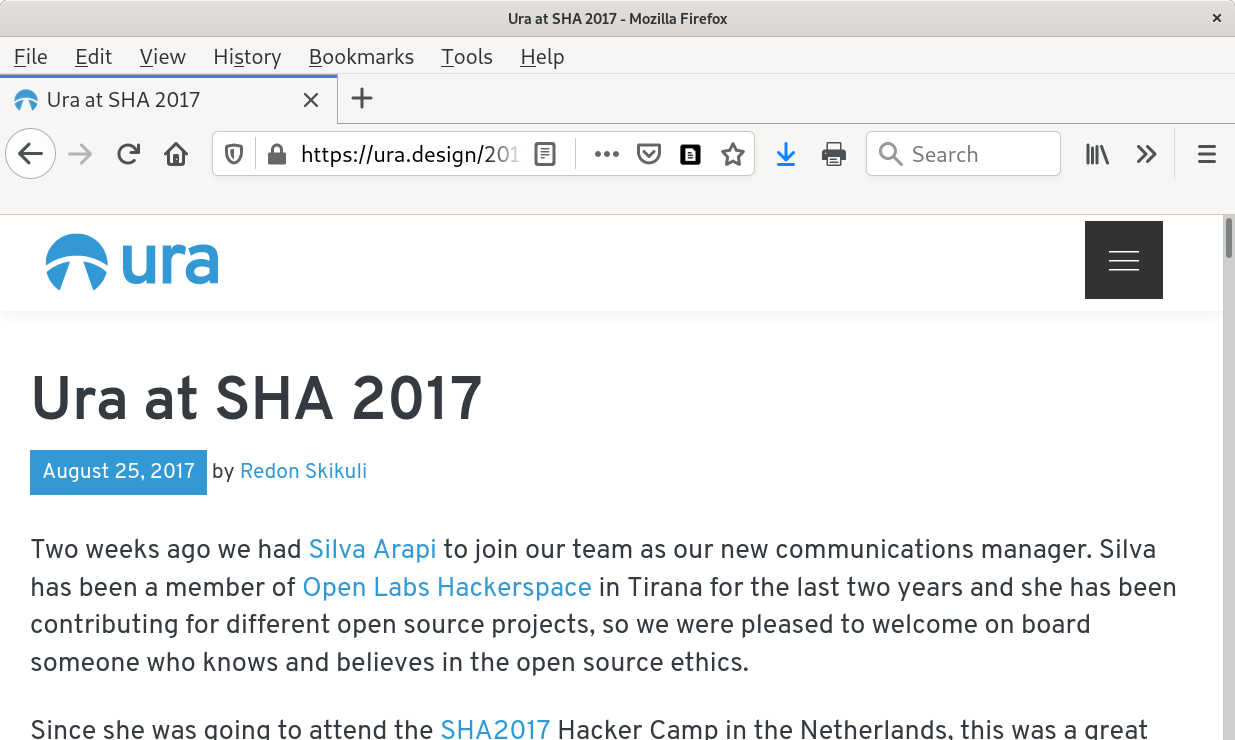
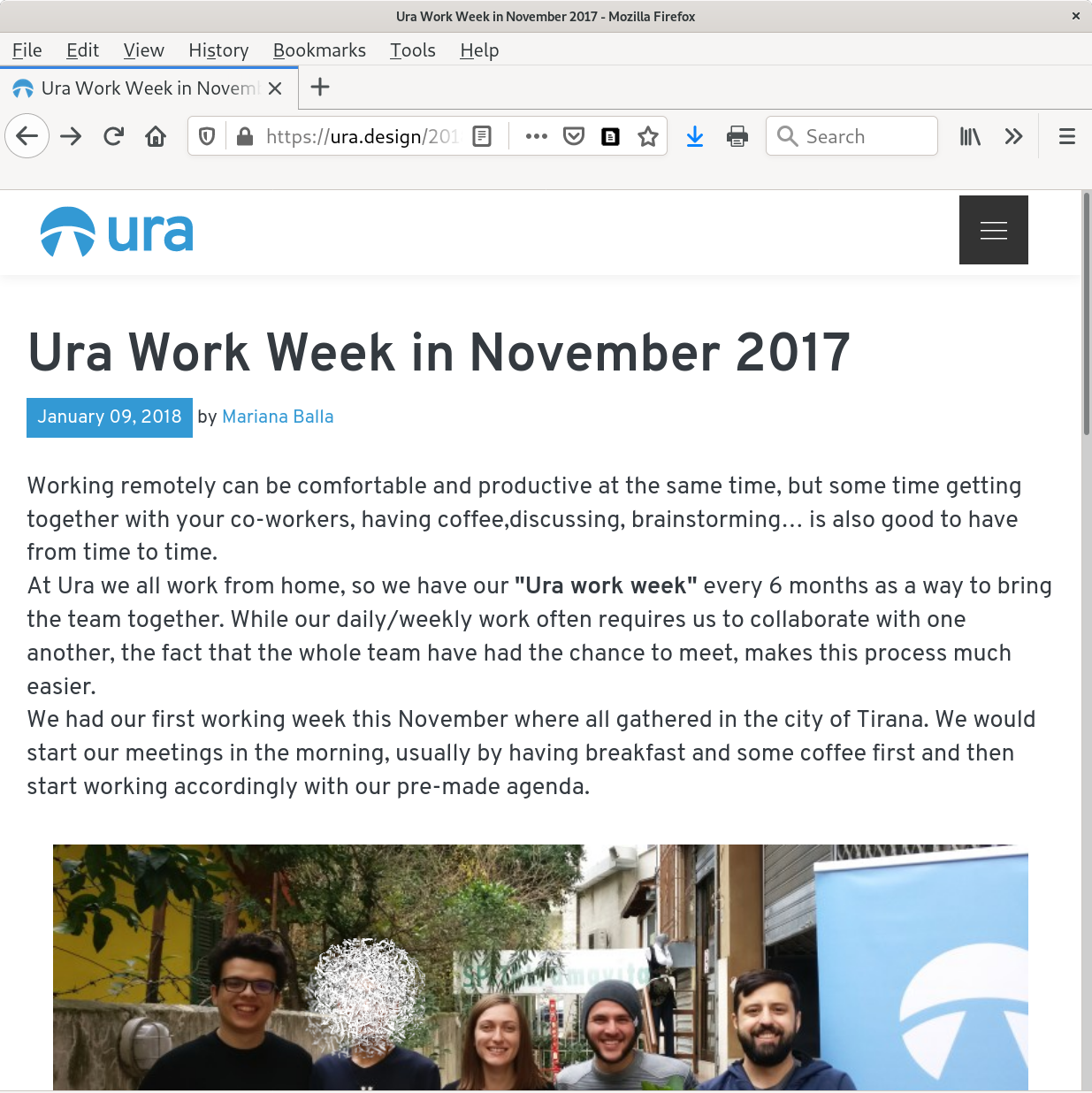
Remember that this event was asking for a registration fee. The discussion forum shows that this fee didn't cover anything related to transport, food or accommodation. In other words, it seems that the organizers volunteering to organize were paying themselves, so they were not really volunteers at all.
(another volunteer): If I’m correct, there is nothing included in the FOSSCamp ticket price ; no food, no accommodation, no drink, …
This occurred immediately after Google left a huge hole in their budget. That left me feeling even more concerned about the pressure that Google creates in different groups and the individual volunteers.
Wikimedia requests were much the same, the request from Silva to Wikimedia mentions Open Labs and not Ura Design:
Silva: I am an active hactivist, member of Open Labs Hackerspace in Tirana, Albania and during the last two years I've organized and participated in different events related to free software, open knowledge, free speech etc. I am an Wikipedian contributor, I ...
With this registration fee going back to the business of Elio and Redon, Elio was actively using his own status as a Wikimedia member to write messages of support for one of the other participants.
Elio: I support the proposal to have Wiki presence at FOSSCamp as it's all happening in a relaxed and laid back environment where participants can learn on their own pace and contribute as well. Nafie has been enthusiastic about leading efforts and has always delivered great results in past events. Her curiosity is her greatest strength and I think FOSSCamp is a great opportunity for her to gain experience, but also help others help Wikipedia as well. I am happily supporting her efforts. --[[User:ElioQoshi|ElioQoshi]] ([[User talk:ElioQoshi|talk]]) 21:19, 19 July 2017 (UTC)
In the Wikimedia funding request, Elio doesn't declare that his company is receiving some of the money. He doesn't mention whether the woman making the request is doing so on behalf of his business, as we saw with the earlier email from Silva. His reference in support of the request appears to be completely impartial.
Bemused by this, Debian Developers tried to contact other "volunteers" who they had met in OSCAL and asked them if they were going to FOSSCamp. Many of them said they were not invited and they didn't know how to get travel funding. Some people told us they were told not to request funding, they had a meeting at the hackerspace and they were told that they have to take turns. Silva, Nafi and Sidorela got this turn. It looks like the FOSSCamp organizers were acting like gatekeepers, allowing their friends, employees and others they may have had conflicts of interest with to make the first requests.
This quote from the Wikimedia talk page makes it even more clear:
I see that you, Silva.1994 and Nafie shehu have all submitted requests for travel support from Albania for your participation at FOSScamp Syros 2017. Based on the agenda for this event, it appears that the three of you are collaborating at this event. Generally, in the Travel and Participation Support program, we try to limit the number of requests we fund for any given event.
These travel requests didn't look very big for large organizations like Debian and Wikimedia. For Albanians, these sums of money are huge. Each person is requesting the equivalent of a month's salary for a student in Albania.
On the other hand, the cost of going to Greece was impossible for any Albanian students to pay if they didn't get funding. This event could only work if every single participant got full funding. A much larger number of people could participate if the event was held in Albania or one of their closest neighbours.
When I helped some women to submit their funding requests directly, on at least one occasion I witnessed the local men shouting about it. Shouting at women.
A Code of Conduct for women
- Thou shall not speak (yes, the title is Confidentiality Agreement for Open Labs Members, what a contradiction).
- Thou shall ask for permission before requesting funding from other groups.
- Thou shall give us a report on every contact you meet in outside events (so we can use them for our business).
- Thou shall be expelled if you miss three meetings in a row.
Various women informed me that this Code of Conduct was being enforced in their group.
The behavior of this group may seem outrageous: but in fact it is enabled by many other people turning a blind eye. People from big companies like Google and Canonical/Ubuntu will put on a volunteer t-shirt and try to hide who they really work for. They ask for all kinds of favours from genuine volunteers.
Ironically, money donated to empower women is having the opposite effect. Gatekeepers control the access to travel grants and Outreachy internships and use this to exert influence over women.
In a previous blog, I suggested that diversity statistics fell by 14% after the project adopted a Code of Conduct and started to pay Outreachy interns. The evidence in this blog may give hints about the reasons for that.
From the US State Department definition of Modern Slavery:
Human trafficking can include, but does not require, movement. People may be considered trafficking victims regardless of whether they were born into a state of servitude, were exploited in their home town, were transported to the exploitative situation, previously consented to work for a trafficker, or participated in a crime as a direct result of being trafficked. At the heart of this phenomenon is the traffickers’ aim to exploit and enslave their victims and the myriad coercive and deceptive practices they use to do so.
In other words, the 70-80% female:male in Chris Lamb's comments didn't represent empowerment, it represented deceptive practices to make women work at OSCAL and coercive practices to prevent them sending funding requests for other events.
The bait-and-switch, alternating between a for-profit and non-profit entity, would also appear to be a deceptive practice as defined by the US State Department.
The Open Labs NDA appears to be prima facie evidence of men attempting to exploit and enslave female volunteers. Women told me they felt apprehension about speaking after they signed this document.
In a previous blog about the harassment issues I've assisted people with, the second woman quoted was from Albania. I repeat her comments here:
Subject: Re: "free travel"
Date: Mon, 5 Mar 2018 23:51:28 +0100
From: Anisa Kuci <anisakuci9@gmail.com>
To: larjona@debian.org
CC: Chris Lamb <lamby@debian.org>, Daniel Pocock <daniel@pocock.pro>,
leader@debian.org, antiharassment@debian.org
Hello Chris, Daniel, Laura,
Thank you very much for being so supportive.
I read the comments on the thread and to be honest I am really sad that
Elio [Qoshi] said that. It is not true at all.
They (Elio [Qoshi] & Redon) pretend to support women but on the other hand their
behavior towards many of us shows the opposite.
Daniel I feel bad because you have encouraged and helped not only me,
but so many other people, no matter if they are Open Labs members or
not, and also all the attendees from Kosova to learn new things, to work
and improve their skills and knowledge. They are doubting your good
intentions just to remove the attention from the shady things that they
are doing.
The free travel comment is really offensive to me and i feel it should
be offensive to every woman who is part of the community.
I have been contributing and supporting Open Labs since its early days,
and I have put a lot of effort and time, I do this because I believe in
what it is meant to stand for and without waiting something in exchange,
but the situation lately has been not very positive. Daniel has been
present by chance in few cases where situations have been very hard to
go through.
I would definitely like to talk to any of you and tell you more about
everything that is happening here, its fine to me whether it is a video
call, call or just emails.
Please tell me what would be more convenient to you.
King greetings,
Anisa
On 5 March 2018 at 18:10, Laura Arjona Reina <larjona@debian.org
<mailto:larjona@debian.org>> wrote:
Hello
El 5 de marzo de 2018 17:40:00 CET, Chris Lamb <lamby@debian.org escribió:
>[Adding antiharrassment to CC]
>
>Daniel Pocock wrote:
>
>> If Elio or anybody else has made any other comments like this on the
>> private members channel or Telegram and you want to discuss them with
>me
>
>[..]
>
>Anisa, please feel to drop Daniel from any replies you wish to make, if
>you even wish to do so.
>
>(Daniel, thank you for your concern but we have got it from this point
>onwards. There will be no need for you to reply further on this
>thread.)
>
>
I may be silent but I'm listening (reading here and also subscribed
to the OpenLabs Forums, and up to date with the (public) English
posts so far).
Ping me if you need anything.
Best regards
--
Laura Arjona Reina
https://wiki.debian.org/LauraArjona
Sent with K-9 mail
What we see here is a woman from Albania referring to the same type of behaviour as the woman in Canberra who I quoted at the start of this blog.
Women were deceived to feel that they had created something, the non-profit, Open Labs. Goodwill was diverted to something else. We wouldn't accept Ura Design using the name of some other arbitrary non-profit like Amnesty or WWF. How can they simply borrow the name of Open Labs?
The amount of money may seem trivial but the principle of both men and women being equal in an organization is apparently unaffordable even at this level.
An email from Arjen Kamphuis before his disappearance contained the following comment:
I don't want to get caught up in internal politics but have noticed some strange events around the Dutch visit I've organised and co-funded for next month. Will have discusson about that with Openlabs and especially Redon who seems to put himself in positions of control in cases he should not.
Yet how can we blame the Albanians for this when they see Google and Canonical employees doing exactly the same thing? Both of those firms are notorious for going under the radar and using private email addresses to communicate with volunteers for projects incidental to their work.
Please see some of my other pages about how Outreachy fell into disrepute.